Social Reform Movement In India and Women Education from 19th Century – UGC seminar held at the Ongole campus of the Sri Acharya Nagarjuna University [1]
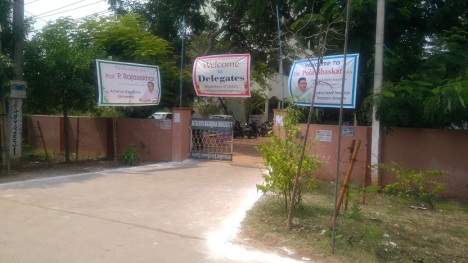
PG Campus of Acharya Nagarjuna University (ANU) has become the Andhra Kesari Tanguturi Prakasam University: The U.G.C. sponsored National Seminar on Social Reform Movement In India and Women Education from 19th Century was held at the Ongole campus of the Sri Acharya Nagarjuna University from 19th and 20th February 2020. The government has upgraded the erstwhile PG Campus of Acharya Nagarjuna University (ANU) into a new university named as the Andhra Kesari Tanguturi Prakasam University [AKTP University]. The Ongole-AKTP University is fortunate in this regard, as it had an advantage of owning 100 acres of land at Pernamitta village within the Ongole city limits. The university is set up over 114 acres of land allotted for the Ongole PG Centre. It is currently running with 10 postgraduate courses and has 137 private un-aided colleges affiliated to it. Around 48 staff are working in the PG Centre and withe the upgradation, the number is likely to increase. As for as Ongole is concerned, I have come here several times to attend seminars in 2013[1], 2014[2], 2016[3], 2018[4] etc., and it is not a new place and I have covered and posted in my blogs also [the links are given below]. Thus, I used to meet our friends again and again. It would be very nice to meet elders and get blessings, meet colleagues to share ideas and youngsters to understand the present times, as we have still been in learning processes from others. From 2013 to 2020, I have to note the changes taking place there.
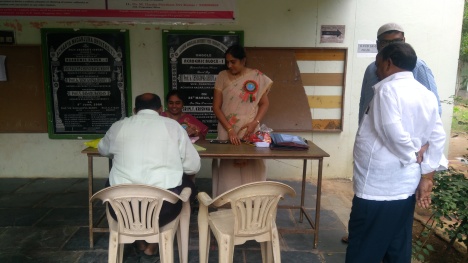
The Theme of the Seminar[5]: Nineteenth-Century of British India is a milestone for the social reform movement in India. In the course of century, the social reformers of Indian and Christian Missionaries adapted several initiations for the uplift of women as well as depressed classes. The reformers, as well as Missionaries in India, have studied the caste system of India. They observed the role of women down through the ages. For instance, in the Vedic period, women were in high esteem. Women shared education along with men. Since the 8th Century, gradually women life became very seclude in Sub-continent. No refreshing streams flowed back, into the life of women in their homes and as centuries passed, the Brahmanical code. The decline of women education was so marked and rapid by the beginning of 19th Century, hardly one woman in a hundred could read in Madras Presidency and Malwa. It may, therefore, be stated that at the advent of British rule, female education had practically disappeared from Hindu Community, nay, it was regarded as a source of moral danger, if not as an actual vice, since only dancing girls could normally read and write. In their families, the old tradition to teach reading & writing to the new generations was continued. However, from the second decade of the 19th century with the initiation of East India Company, Missionaries and social reformers the importance of education of women and upliftment and elevation of depressed classes were started. In this way, the Indian renaissance started in nineteenth-century and several reforms transformed the Indian society in addition to the upliftment of woman status. Further, it also elevated the status of depressed classes.
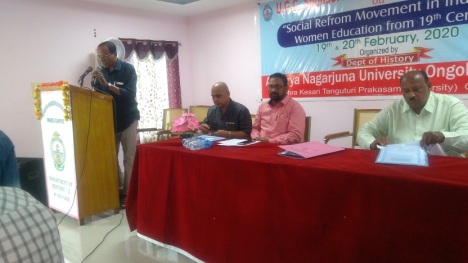
The Sub-themes of the seminar: The following these were also identified as sub-themes for the seminar and paper presentation:
- Role of Reformers
- Upliftment of Dalits
- Indian Renaissance in the 19th Century
- Uplift of women
- Role of Press in the Social Reform Movement
- Role of Christian Missionaries
- Status of women Education
- Any other issue related to the Seminar theme
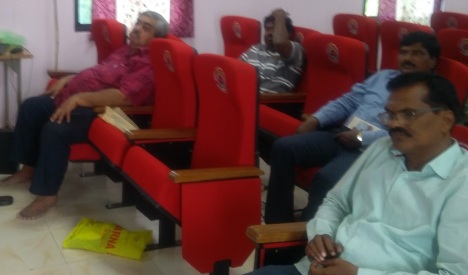
The seminar hall at the second floor had a facelift, but without lift and wash-room: About the seminar hall, I have already recorded in my earlier blog as, “The seminar was held at the auditorium situated at the second floor of the building. Here, there is no lift, in other words, the building has not changed like Ongole. Nowadays, lifts can be provided with 4 to 8 lakh budget and it is not at all a big amount for Universities, as they get funds. ” And still, no provision has been made for urinal/toilet/restroom facility, though, the seminar has been modernized with chairs, stage and AC facilities. The difference can be noted from the photos of mine included in my blogs covering the earlier seminars attended. Nowadays, people give facelift only forgetting the other parts and it happens everywhere. Many times, we talk about principles, lecture about code of conduct and advocate all sorts of moral values and all, but, when anything comes to practice, most of us want to avoid, evader even started arguing against apologetically.
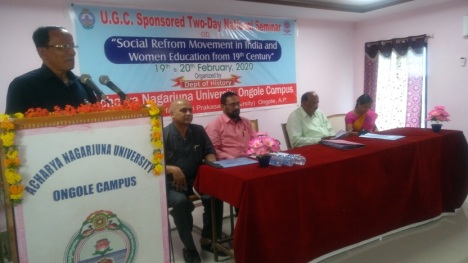
Ongole, where I get varieties of pickles: Earlier, daily, I used to go for walking up to the junction where there is a church and statues for the former CM and the bodyguard that got killed in the air accidence. But, this year, because of my health condition, I could not go. In fact, here in the Hotel Abhilash, I was accommodated in the first floor Room no.215 along with Prof Madhusudhana Rao, Tirupati, where there is no lift. Thus, from 2013, except the hall, nothing has changed as for as the lift and urinal. Definitely, it has been difficult and inconvenience for the aged and as well as sugar patents, they might relax once in three hours or so. Incidentally, Ongole has been famous for food in the sense that they sell side-dishes separately in packets. When I had meals first time in 2013, I was about to complete the taking meal and get up, but, suddenly, the server came and pointed out that I did not taste the other side-dishes showing kept on the other side of the table. In fact, there were nearly 35 items, but, I could not taste all. They sell different varieties of pickles also. Last time, I purchased seven varieties of pickles that we cannot get in Chennai. This time, I could get only five varieties. Thanks to Prof Madhusudhana Rao, who only informed about this and got also!
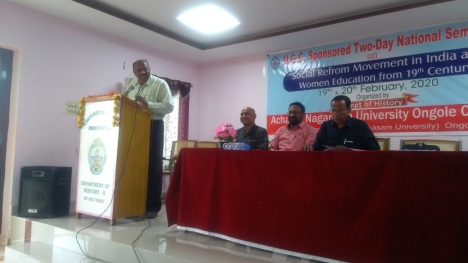
The inauguration of the National seminar 19-02-2020: The moment, we reached the Campus, there was registration. Only 40 registered and 14 with papers. After registration, we went to the seminar hall on the second floor. I had great difficulty to reach the second floor, as I was not feeling well with the raising BP coupled with a breathing problem. The seminar appeared with a new look modified with new chairs and airconditioned. From my postings, you can note the difference between the old hall and the present one. The seminar was inaugurated on 19th morning 11.00 hours by their officials and it was some sort of family affair with the routines of lamp lighting etc.. The chief guest was Sri V. Rangaraju, Director, AP State Archives. The theme of the seminar was explained by the convener, Dr G. Rajmohan Rao. The inaugural address was by Dr I. Thirumali and the key-note address by Prof Adapa Satyanarayana. The guests, invitees were honoured and they talked about the subject matter and issues of the seminar.
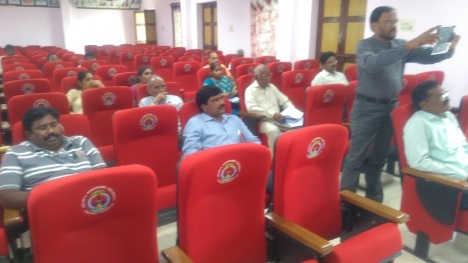
The paper presentation sessions: After the inaugural, there was lunch and after lunch, the paper reading session started. Sudarshan, Madhusudhana Rao,…. and a lady presented papers. Dr Anjaiah presided over and presented his paper also. There was an audience of 20 only. Madhusudhana Rao presented the paper, “Colonial Prostitution of Whites and Blacks: How White and Black prostitutions were considered, treated and controlled,” was a joint paper co-authored by K. V. Ramakrishna Rao. Perhaps, for the first time, this aspect has been raked up fr research and facts brought out about the British exploitation of Indian women during the colonial period, when much raise was heaped upon them for their great role involved in the upliftment of Indian women. V. Sudarshan read a paper on Durgabai Deshmukh, and such details are already available[6]. In fact, in Chennai, the hospital started by her working under the banner of “Andhra Mahila Sabha” has been well known to serve the poor and the middle-class people of Chennai. The lady-paper presenter was blaming Brahmins for their exclusion, treating menstrual women kept in rooms, “too much untouchability” followed among themselves etc, but, in between, she was reading about other issues that are not connected with what he was trying to point out. Though Anjaiah and others discussed about Andhra women who worked for the upliftment of women, they never mentioned that those women were Brahmins. Thus, her bias in the paper presentation was revealed and it was questioned by Anjaiah, Sudarshan and others. The sectional president also advised her to take the points and change the paper suitably.
© K. V. Ramakrishna Rao
23-02-2020
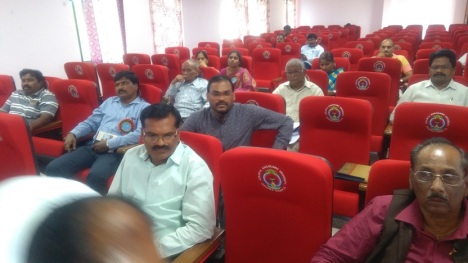
[1] National Seminar on Migration Movements and Indian Diaspora in Modern Period was held on April 3rd and 4th 2013 at the ANU Ongole campus. My coverage of the proceedings can be read here:
[2] National Seminar on “Historicity of Ramayana” held at Ongole, Andhrapradesh on November 8th and 9th 2014. My coverage of the proceedings can be read here:
[3] Social Justice and the Marginalized in South India: Experiences and Challenges” – National seminar held at C. S. R. Sarma College, Ongole on July 30th and 31st, 2016. My coverage of the proceedings can be read here:
[4] Indian press and Socio-cultural and Religious Transformation in Colonial Rule of 19th and 20th Centuries: A New Perspective – National Seminar held at Nsgarjuna University, Ongole Campus. My coverage of the proceedings can be read here in three parts:
[5] Based on the circular of the seminar of the orgainizers issued this year 2020. However, I have a feeling that these sentences, I could remember of heard or read somewhere in some conference. I am not able to recollect immediately now.
[6] https://ddms.co.in/ – and https://ddms.co.in/founder/here about the institutional details can be found; https://ddms.co.in/milestones/ – here, the achievements of Durgabhai Deshmukh with details and photos can be seen.
Filed under: Acharya, Adapa satyanarayana, ambedkar, andhra, anti-brahman, anti-brahmin, anti-hindu, anti-india, anti-indian, anti-vedic, ayah, baby-sitter, Bengali, bifurcate, blind-belief, Brahma, brahmin, category, censor, censorship, child marriage, Christian Missionaries, civilization, colonial, colony, compassion, conduct, controversy, dalit, Dravidian, emotion, evidence, female infanticide, feminist, freedom of press, freedom of thought, gandhi, gandhiji, harem, Hindu, Hindu religion, Hinduism, historicity, historiography, history, K. V. Ramakrishna Rao, labour, myth, myth promoted, nation, nation building, nation-state, nationalism, nationality, non-brahmin, non-vegetarian, non-violence, patriarchal, purdah, Ramakrishna Rao, reform, reformation, research, research paper, researcher, right, Role of Christian Missionaries, Role of Reformers, sati, sex, sexploitation, sexual, slave, slavery, social justice, social reform, Social Reform Movement, Social Reform Movement In India, social reformation, Status of women Education, suppression, Uplift of women, Upliftment of Dalits, Veda, white, women education, zenana | Tagged: burning widow, child marriage, Christian Missionaries, colonial, colonial rule, colonialism, colony, divorce, female infanticide, K. V. Ramakrishna Rao, Ramakrishna Rao, reformation movement, right, Role of Christian Missionaries, Role of Reformers, sati, social, social refomation, social reform, Social Reform Movement, Social Reform Movement In India, Status of women Education, Uplift of women, Upliftment of Dalits, woman right, women, women education | Leave a comment »

